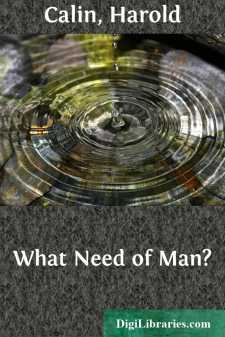Categories
- Antiques & Collectibles 13
- Architecture 36
- Art 48
- Bibles 22
- Biography & Autobiography 813
- Body, Mind & Spirit 142
- Business & Economics 28
- Children's Books 14
- Children's Fiction 11
- Computers 4
- Cooking 94
- Crafts & Hobbies 4
- Drama 346
- Education 46
- Family & Relationships 57
- Fiction 11828
- Games 19
- Gardening 17
- Health & Fitness 34
- History 1377
- House & Home 1
- Humor 147
- Juvenile Fiction 1873
- Juvenile Nonfiction 202
- Language Arts & Disciplines 88
- Law 16
- Literary Collections 686
- Literary Criticism 179
- Mathematics 13
- Medical 41
- Music 40
- Nature 179
- Non-Classifiable 1768
- Performing Arts 7
- Periodicals 1453
- Philosophy 64
- Photography 2
- Poetry 896
- Political Science 203
- Psychology 42
- Reference 154
- Religion 513
- Science 126
- Self-Help 84
- Social Science 81
- Sports & Recreation 34
- Study Aids 3
- Technology & Engineering 59
- Transportation 23
- Travel 463
- True Crime 29
What Need of Man?
by: Harold Calin
Description:
Excerpt
hen you are out in a clear night in summer, the sky looks very warm and friendly. The moon is a big pleasant place where it may not be so humid as where you are, and it is lighter than anything you've ever seen. That's the way it is in summer. You never think about space being "out there". It's all one big wonderful thing, and you can never really fall off, or have anything bad happen to you. There is just that much more to see. You lie on the grass and look at the sky long enough and you fall into sort of a detached mood. It's suddenly as if you're looking down at the sky and you're lying on a ceiling by some reverse process of gravitation, and everything is absolutely pleasant.
In winter it's quite another thing, of course. That's because the sky never looks warm. In winter, if you are in a cold climate, the sky doesn't appear at all friendly. It's beautiful, mind you, but never friendly. That is when you see it as it really is. Summer has a way of making it look friendly. The way you see it on a winter night is only the merest idea of what it is really like. That's why I can't feel too bad about the monkey. You see, it might have been a man, maybe me. I've been out there, too.
There are two types of classified government information. One is the type that is really classified because it is concerned with efforts and events that are of true importance and go beyond public evaluation. Occasional unauthorized reports on this type of information, within the scope that I knew it at least, are written off as unidentified flying objects or such. The second type of classified information is the kind that somehow always gets into the newspapers all over the world ... like the X-15, and Project Dyna-Soar ... and Project Argus.
Project Argus had as its basis a theory that was proven completely unsound six years ago. It was proven unsound by Dennis Lynds. He got killed doing it. It had to do with return vehicles from capsules traveling at escape velocity, being oriented and controlled completely by telemetering devices. It didn't work. This time, the monkey was used for newspaper consumption. I'm sure Bannister would have preferred it if the monkey had been killed on contact. It would have been simpler that way. No mass hysteria about torturing a poor, ignorant beast. A simple scientific sacrifice, already dead upon announcement, would have been a fait accompli, so to speak, and nothing could overshadow the success of Project Argus.
But Project Argus was a failure. Maybe someday you'll understand why.
Because of the monkey? Possibly. You see, I flew the second shot after Lynds got killed. After that, came the hearing, and after that no men flew in Bannister's ships anymore. They proved Lynds nuts, and got rid of me, but nobody would try it, even with manual controls, where there is no atmosphere.
When you're putting down after a maximum velocity flight, you feed a set of landing coordinates into the computer, and you wait for the computer to punch out a landing configuration and the controls set themselves and lock into pattern. Then you just sit there. I haven't yet met a pilot who didn't begin to sweat at that moment, and sweat all the way down. We weren't geared for that kind of flying. We still aren't, for that matter. We had always done it ourselves, (even on instruments, we interpreted their meaning to the controls ourselves) and we didn't like it. We had good reason. The telemetry circuits were no good. That's a bad part of a truly classified operation: they don't have to be too careful, there aren't any voters to offend. About the circuits, sometimes they worked, sometimes not. That was the way it went. They wouldn't put manual controls in for us....


